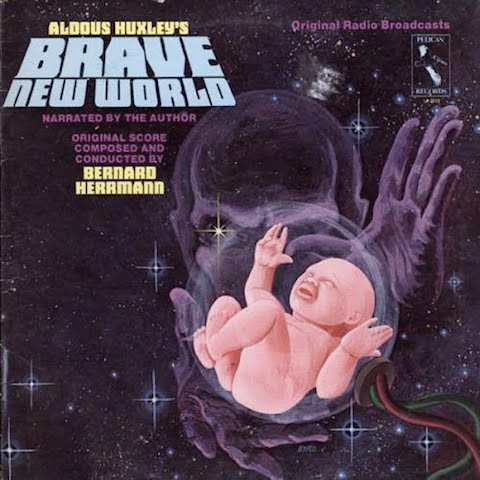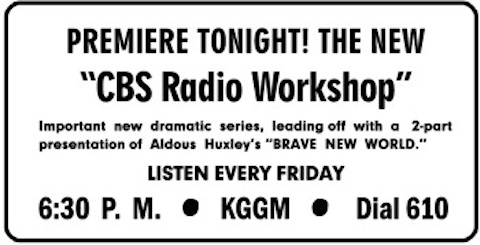
We are, it appears, in the midst of a “podcasting renaissance,” as Colin Marshall has recently pointed out. And yet, like him, I too was unaware that “podcasting had gone into a dark age.” Nevertheless, its current popularity—in an age of ubiquitous screen technology and perpetual visual spectacle—speaks to something deep within us, I think. Oral storytelling, as old as human speech, will never go out of style. Only the medium changes, and even then, seemingly not all that much.
But the differences between this golden age of podcasting and the golden age of radio are still significant. Where the podcast is often off-the-cuff, and often very intimate and personal—sometimes seen as “too personal,” as Colin writes—radio programs were almost always carefully scripted and featured professional talent. Even those programs with man-on-the street features or interviews with ordinary folks were carefully orchestrated and mediated by producers, actors, and presenters. And the business of scoring music and sound effects for radio programs was a very serious one indeed. All of these formalities—in addition to the limited frequency range of old analog recording technology—contribute to what we immediately recognize as the sound of “old time radio.” It is a quaint sound, but also one with a certain gravitas, an echo of a bygone age.
That golden age waned as television came into its own in the mid-fifties, but near its end, some broadcast companies made every effort to put together the highest quality radio programming they could in order to retain their audience. One such program, the CBS Radio Workshop, which ran from January, 1956 to September, 1957, may have been “too little too late”—as radio preservationist site Digital Deli writes—but it nonetheless was “every bit as innovative and cutting edge” as the programs that came before it. The first two episodes, right below, were dramatizations of Aldous Huxley’s Brave New World, read by the author himself. (Find it also on Spotify here.) The series’ remaining 84 programs drew from the work of Antoine de Saint-Exupéry, James Thurber, H.L. Mencken, Mark Twain, Robert Heinlein, Eugene O’Neil, Balzac, Carl Sandburg, and so many more. It also featured original comedy, drama, music, and This American Life-style profiles and storytelling.
Huxley returned in program #12, with a story called “Jacob’s Hands,” written in collaboration with and read by Christopher Isherwood. The great Ray Bradbury made an appearance, in program #4, introducing his stories “Season of Disbelief” and “Hail and Farewell,” read by John Dehner and Stacy Harris, and scored by future film and TV composer Jerry Goldsmith. Other programs, like #10, “The Exurbanites,” narrated by famous war correspondent Eric Sevareid, conducted probing investigations of modern life—in this case the growth of suburbia and its relationship to the advertising industry. The above is but a tiny sampling of the wealth of quality programming the CBS Radio Workshop produced, and you can hear all of it—all 86 episodes—courtesy of the Internet Archive.
Sample streaming episodes in the player above, or download individual programs as MP3s and enjoy them at your leisure, almost like, well, a podcast. See Digital Deli for a complete rundown of each program’s content and cast, as well as an extensive history of the series. This is the swan song of golden age radio, which, it seems, maybe never really left, given the incredible number of listening experiences we still have at our disposal. Yes, someday our podcasts will sound quaint and curious to the ears of more advanced listeners, but even then, I’d bet, people will still be telling and recording stories, and the sound of human voices will continue to captivate us as it always has.
Related Content:
Free: Listen to 298 Episodes of the Vintage Crime Radio Series, Dragnet
How to Listen to the Radio: The BBC’s 1930 Manual for Using a New Technology
Josh Jones is a writer and musician based in Durham, NC. Follow him at @jdmagness



This is wonderful, thank you for posting this.
What a fantastic resource your site is,we are so lucky to have it. You deserve my eternal thanks for an embarrassment of riches,it’s hard to know where to start.
Open Culture has enriched my life. Learning and entertainment abounds with each edition. Since I’ve discovered this site boredom has become a thing of the past. I’d like to thank each and everyone of you who makes Open Culture possible.
Thanks a lot! I had no clue he narrated his own book. I like listening to audiobooks on my commute, so this will come in handy. Greetings from the UK :)